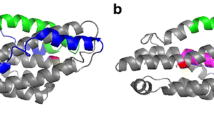Abstract
We have studied the relationship between the apolipoprotein E gene (APOE) and the development of myoclonus, tremors, rigidity and seizures in 168 patients with probable early-onset Alzheimer's disease (AD). There was a statistically significantly lower risk of tremor for carriers of the ɛ4 allele of APOE. This allele was also associated with an increased risk of myoclonus. Our findings suggest that there may be differences in progression and clinical appearance in early-onset AD related to the APOE genotype.
Similar content being viewed by others
References
Basun H, Grut M, Winblad B, Lannfelt L (1995) Apolipoprotein E4 allele and disease progression in patients with late-onset Alzheimer's disease. Neurosci Lett 183:32–34
Bennett C, Crawford F, Osborne A, Diaz P, Hoyne J, Lopeze R, Roques P, Duara R, Rossor M, Mullan M (1995) Evidence that the APOE locus influences rate of disease progression in late onset familial Alzheimer's disease but is not causative. Am J Med Genet 60:1–6
Chartier-Harlin MC, Parfitt M, Legrain S, Pérez-Tur J, Brousseau T, Evan A, Berr C, Vidal O, Roques P, Gouriet V, Fruchart J-C, Delacourte A, Rossor M, Amouyel P (1994) Apolipoprotein E, E4 allele as a major risk factor for sporadic early and late-onset form of Alzheimer's disease: analysis of the 19q13.2 chromosomal region. Hum Mol Genet 3:569–574
Corder EH, Saunders AM, Risch NJ, Strittmatter WJ, Schmechel DE, Gaskell PC, Rimmler JB, Locke PA, Conneally PM, Schmader KE, Small GW, Roses AD, Haines JL, Pericak-Vance MA (1994) Protective effect of apolipoprotein E type 2 allele for late onset Alzheimer disease. Nature Genet 7:180–184
Corder EH, Saunders AM, Strittmatter WJ, Schmechel DE, Gaskell PC, Rimmler JB, Locke PA, Conneally PM, Schmader KE, Tanzi RE, Gusella JF, Small GW, Roses AD, Pericak-Vance MA, Haines JL (1995) Apolipoprotein E, survival in Alzheimer's disease patients, and the competing risk of death and Alzheimer's disease. Neurology 45:1323–1238
Cox DR (1972) Regression models and life tables. J R Stat Soc 34:187–220
Frisoni GB, Govoni S, Geroldi C, Bianchetti A, Calabresi L, Franceschini G, Trabucchi M (1995) Gene dose of the ɛ4 allele apolipoprotein E and disease progression in sporadic late-onset Alzheimer's disease. Ann Neurol 37:596–604
Hauser WA, Morris ML, Heston LL, Anderson VE (1986) Seizures and myoclonus in patients with Alzheimer's disease. Neurology 36:1226–1230
Hughes CP, Berg L, Danziger WL, Colen LA, Martin RL (1982) A new clinical scale for the staging of dementia. Br J Psychiatry 140:566–572
Kurtzke JF (1989) On estimating survival; a tale of two censors. J Clin Epidemiol 42:169–175
Samson WN, Van Duijn CM, Hop WCJ, Hofman A (1996) Clinical features and mortality in patients with early-onset Alzheimer's disease. Eur Neurol 36:103–106
Sorbi S, Nacmias B, Forleo P, Latorraca S, Gobbini I, Bracco L, Piacentini S, Amaducci L (1994) ApoE allele frequencies in Italian sporadic and familial Alzheimer's disease. Neurosci Lett 177:100–102
Stern Y, Albert M, Brandt J, Jacobs DM, Tang MX, Marder K, Bell K, Sano M, Devanand DP, Bijlsma F (1994) Utility of extrapyramidal signs and psychosis as predictors of cognitive and functional decline, nursing home admission, and death in Alzheimer's disease: prospective analyses from the Predictors Study. Neurology 44:2300–2307
Strittmatter WJ, Saunders AM, Schmechel D, Pericak-Vance M, Enghild J, Salvesen GS, Roses AD (1993) Apolipoprotein E: high avidity binding to beta-amyloid and increased frequency of type 4 allele in late-onset familial Alzheimer's disease. Proc Natl Acad Sci USA 90:1977–1981
Van Duijn CM, Knijff P de, Cruts M, Wehnert A, Havekes LM, Hofman A, Van Broeckhoven C (1994) Apolipoprotein E4 allele in a population-based study of early-onset Alzheimer's disease. Nature Genet 7:74–78
Van Duijn CM, Knijff P de, Wehnert A, De Voecht J, Bronzova JB, Havekes LM, Hofman A, Van Broeckhoven C (1995) The apolipoprotein E ɛ2 allele is associated with an increased risk of early-onset Alzheimer's disease and a reduced survival. Ann Neurol 37:605–610
Author information
Authors and Affiliations
Corresponding author
Rights and permissions
About this article
Cite this article
Bronzova, J., van Duijn, C.M., Havekes, L.M. et al. Apolipoprotein E genotype and concomitant clinical features in early-onset Alzheimer's disease. J Neurol 243, 465–468 (1996). https://doi.org/10.1007/BF00900501
Received:
Revised:
Accepted:
Issue Date:
DOI: https://doi.org/10.1007/BF00900501




